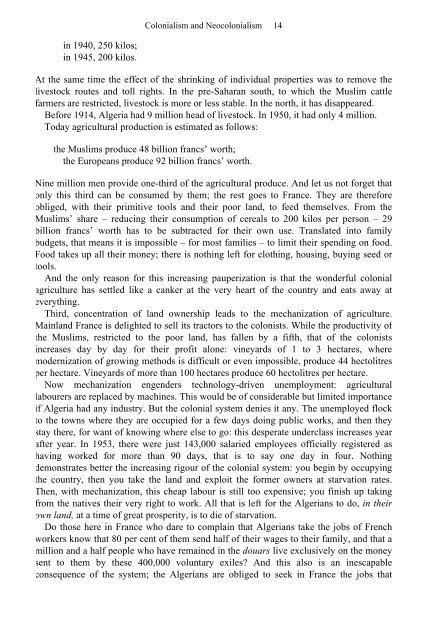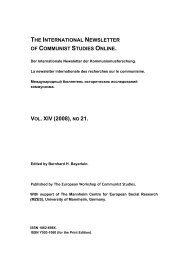11RXNdQ
11RXNdQ
11RXNdQ
You also want an ePaper? Increase the reach of your titles
YUMPU automatically turns print PDFs into web optimized ePapers that Google loves.
in 1940, 250 kilos;<br />
in 1945, 200 kilos.<br />
Colonialism and Neocolonialism 14<br />
At the same time the effect of the shrinking of individual properties was to remove the<br />
livestock routes and toll rights. In the pre-Saharan south, to which the Muslim cattle<br />
farmers are restricted, livestock is more or less stable. In the north, it has disappeared.<br />
Before 1914, Algeria had 9 million head of livestock. In 1950, it had only 4 million.<br />
Today agricultural production is estimated as follows:<br />
the Muslims produce 48 billion francs’ worth;<br />
the Europeans produce 92 billion francs’ worth.<br />
Nine million men provide one-third of the agricultural produce. And let us not forget that<br />
only this third can be consumed by them; the rest goes to France. They are therefore<br />
obliged, with their primitive tools and their poor land, to feed themselves. From the<br />
Muslims’ share – reducing their consumption of cereals to 200 kilos per person – 29<br />
billion francs’ worth has to be subtracted for their own use. Translated into family<br />
budgets, that means it is impossible – for most families – to limit their spending on food.<br />
Food takes up all their money; there is nothing left for clothing, housing, buying seed or<br />
tools.<br />
And the only reason for this increasing pauperization is that the wonderful colonial<br />
agriculture has settled like a canker at the very heart of the country and eats away at<br />
everything.<br />
Third, concentration of land ownership leads to the mechanization of agriculture.<br />
Mainland France is delighted to sell its tractors to the colonists. While the productivity of<br />
the Muslims, restricted to the poor land, has fallen by a fifth, that of the colonists<br />
increases day by day for their profit alone: vineyards of 1 to 3 hectares, where<br />
modernization of growing methods is difficult or even impossible, produce 44 hectolitres<br />
per hectare. Vineyards of more than 100 hectares produce 60 hectolitres per hectare.<br />
Now mechanization engenders technology-driven unemployment: agricultural<br />
labourers are replaced by machines. This would be of considerable but limited importance<br />
if Algeria had any industry. But the colonial system denies it any. The unemployed flock<br />
to the towns where they are occupied for a few days doing public works, and then they<br />
stay there, for want of knowing where else to go: this desperate underclass increases year<br />
after year. In 1953, there were just 143,000 salaried employees officially registered as<br />
having worked for more than 90 days, that is to say one day in four. Nothing<br />
demonstrates better the increasing rigour of the colonial system: you begin by occupying<br />
the country, then you take the land and exploit the former owners at starvation rates.<br />
Then, with mechanization, this cheap labour is still too expensive; you finish up taking<br />
from the natives their very right to work. All that is left for the Algerians to do, in their<br />
own land, at a time of great prosperity, is to die of starvation.<br />
Do those here in France who dare to complain that Algerians take the jobs of French<br />
workers know that 80 per cent of them send half of their wages to their family, and that a<br />
million and a half people who have remained in the douars live exclusively on the money<br />
sent to them by these 400,000 voluntary exiles? And this also is an inescapable<br />
consequence of the system; the Algerians are obliged to seek in France the jobs that




